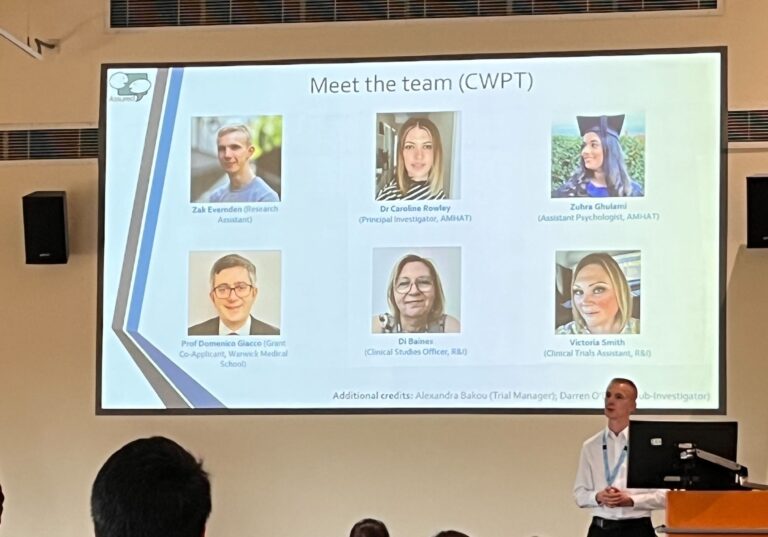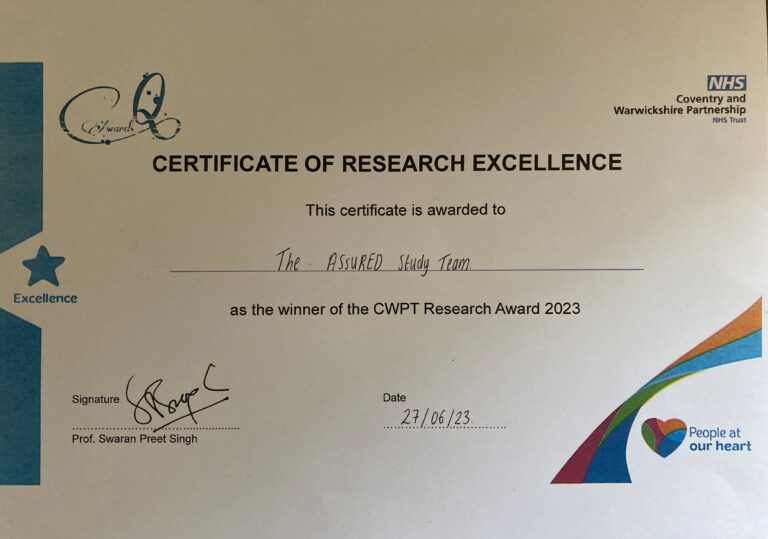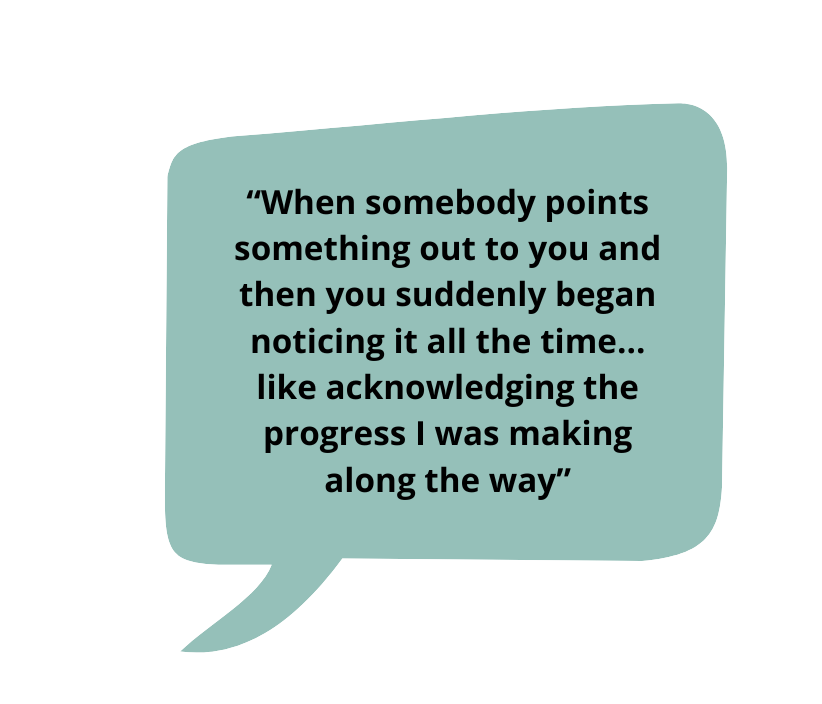News and Updates
Latest news: July 2025
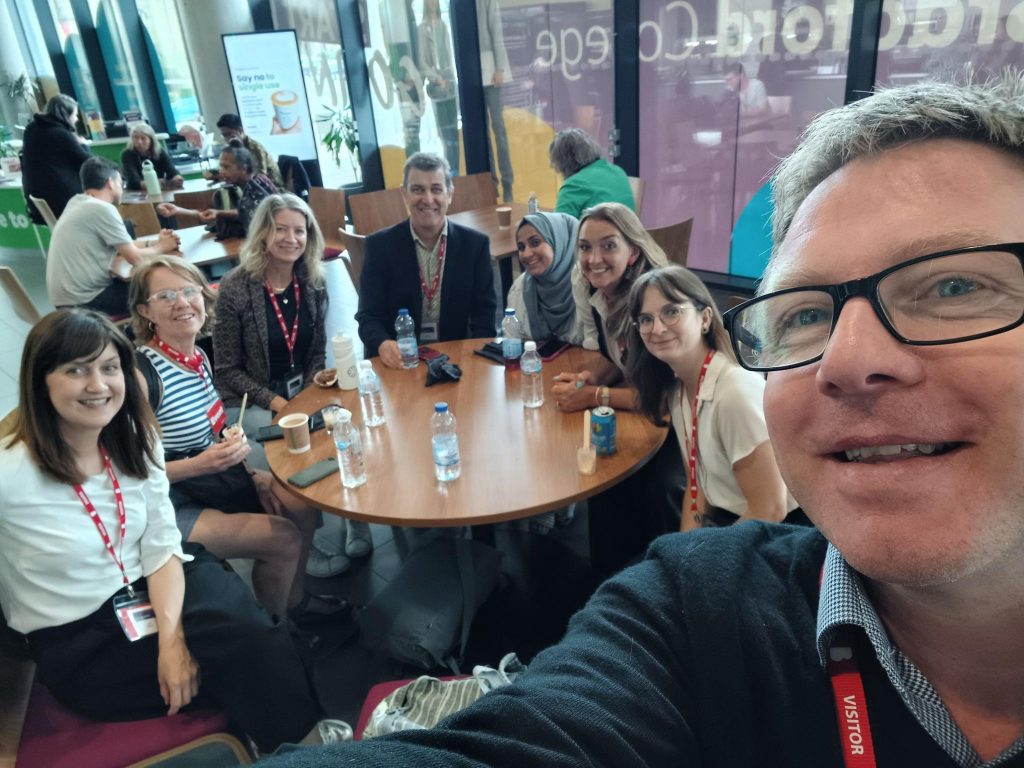
Left to right – Aine Anne Garvey, Michele Orr, Rose McCabe, Guy Shennan, Aamena Akubat, Natasha Adams, Lauren Jerome and Nicky Perry. Check out the post on Linkedin.
Latest news: November 2025
Listening to Practitioners: Supporting People Who Self-Harm in Emergency Departments
Insights from a qualitative study within the ASSURED trial. By Aurelia Hodes, University College London.
Background:
Self-harm can sometimes be a way of coping with overwhelming distress. For many people who self-harm, the emergency department (ED) is the first place to go for help. But EDs are often busy, noisy, and focused on urgent physical care. As such, many people leave feeling unsupported and often practitioners feel powerless. This preliminary study, carried out as part of my MSc project, explored practitioners’ experiences of delivering a brief psychological intervention for people who self-harm in Emergency Departments (EDs), as part of the ASSURED trial.
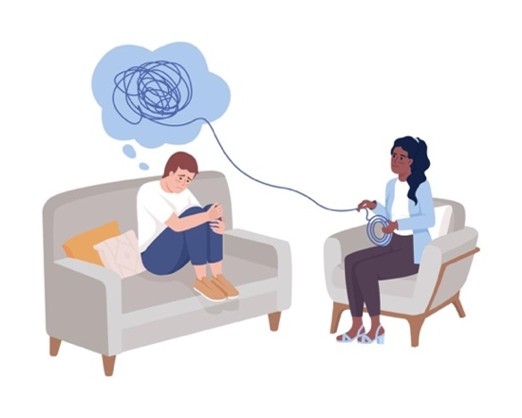
Why it matters:
This study is shaped by practitioners experiences, and can hopefully be used to strengthen ED interventions for mental health in the future.
The ASSURED intervention included:
• A narrative interview, allowing individuals to tell their story in their own words
• A collaboratively developed enhanced safety plan
• Solution-Focused Brief Therapy (SFBT), which aims to build on strengths and focus on achievable next steps
Sixteen practitioners at several hospital sites in England were interviewed about training for and delivering the ASSURED intervention. Common themes and patterns were identified to explore their perspectives on delivering the intervention, to understand what helped and what challenges they faced.
Results:
Four main themes emerged after analysing the interviews:
1) Challenging working conditions
The ED environment made therapeutic work difficult, as it is a busy, noisy environment. Most sessions therefore ran online, which many felt reduced distress and improved flexibility. However, some practitioners felt that working remotely made it harder to pick up emotional cues that help build rapport. Balancing the intervention with high workloads, and immediate risk management was a consistent challenge.
2) The intervention created space for hope
Practitioners appreciated the clear structure and containment provided by the manual. They valued the emphasis on human connection and continuity, with patients seeing the same practitioner across sessions. Core components were seen as helpful: the narrative interview offered space to talk and feel validated, the safety plan made coping steps concrete, and the solution-focused work supported hope and strengths.
3) Challenges in learning a new intervention
Some elements felt too rigid or repetitive, especially when growth between sessions was limited. Practitioners also found that adapting for neurodiversity, substance misuse, or significant physical illness sometimes required more tailoring.
4) Personal and professional development
Many practitioners reported growth in skills and confidence, and led to some leaving sessions “on Cloud 9” after seeing change. Others felt under-prepared or outside their comfort zone for parts of the model, highlighting a need for ongoing supervision and training refreshers.
Strengths and limitations:
The in-depth interviews with practitioners allowed them to reflect openly about their experiences. However, those with the time and capacity to take part may not fully represent practitioners, as overstretched staff were not as likely to participate.
Implications and next steps:
• Flexibility is key. Session timing, pacing and language may need adapting for different individuals
• Practitioners require sustainable caseloads, protected time to deliver interventions and consistent supervision.
• Training should include refreshers from time to time, so staff stay confident and consistent in their care.
• Small moments of empathy can meaningfully support people during crisis.
• Future research could explore whether staff confidence and relationships with patients influence outcomes.
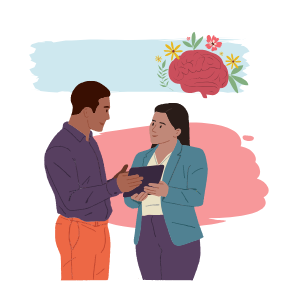
Conclusion:
EDs are high-pressure environments, but they are also critical points of contact for people who self-harm. Practitioners valued intervention approaches that allow space for patients to be heard and create space for hope. To deliver such interventions effectively, it is important to support staff too.
Latest news: June 2024
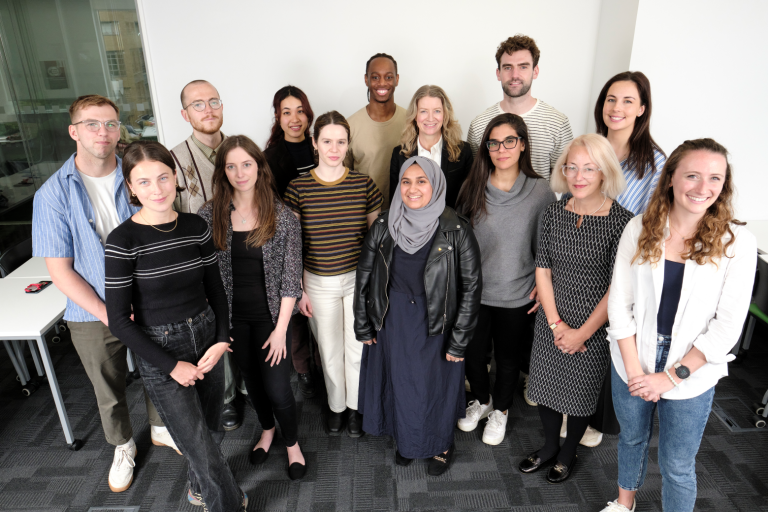
Project shortlisted for the City University ‘Research Project of the Year’
We were delighted to be shortlisted for this award by the University. We feel like it’s a recognition of all the commitment and dedication that goes into the study and would like to thank all our collaborators and participants for making this possible.
Presentation from the National Suicide Prevention Alliance Seminar now available online
If you missed our recent presentation to the National Suicide Prevention Alliance, you can now access the talk with slides here: https://nspa.org.uk/event/webinar-improving-outcomes-in-patients-who-self-harm/
Forthcoming ASSURED & SASH external presentations
We are delighted to be presenting the ASSURED and SASH studies at the National Suicide Prevention Alliance Seminar
on Tuesday 21st May, 12pm – 1.30pm. We will be presenting the progress of the two studies so far and sharing practitioner perspectives from each study.
This webinar is for NSPA members who are either:
- Academics in the wider field (psychology, social work, nursing, psychiatry etc.)
- Mental health practitioners and other practitioners
- People with lived experience
You can book your tickets for free on eventbrite. For more information, see this link: Webinar, 21st May: Improving outcomes in patients who self-harm – NSPA
We will also be running a workshop about solution focused work with adolescents and adults in mental health crisis settings at the UK Association for Solution Focused Practice Conference (July 2nd, 3rd) in Colchester.
This conference is focussed on developing solution focused practice with practitioners and is a major UK conference. For more information see this link: https://ukasfp.site-ym.com/page/conf2024rose
You can book tickets here: https://ukasfp.site-ym.com/page/conf2024
Latest news; April 2024
Thank you to everyone who supports our project! Here’s our latest news in April 2024
We’ve been busy disseminating the project at the NIHR ARC South London Knowledge Exchange Event 2024. The event brought together stakeholders, including patients, the general public, practitioners and researchers for dynamic discussion – sharing insights, evidence, and expertise, with a focus on exploring the unspoken aspects of health communication alongside ways to enhance working together. We heard some really powerful talks about the difficulties of advocating in the NHS as a patient. Five researchers presented – Lucy Goldsmith, Ella Rowbotham, Aneta Zarska, Hema Kalyanasundaram and Mayuri Jasenthuliyana. You can find out more about the event here: (https://impsciconference.com/arc-south-london-knowledge-exchange-event/)
We know that many members of the general public don’t tend to read scientific papers, so we made this paper more accessible by creating a video. The paper reports our exploration of experiences of going to of self-harm in emergency departments, comparing perspectives of patients, carers and practitioners.
Making a difference through doing research is really important to us and in order to do this we need to publish our research! We know that many members of the general public don’t tend to read scientific papers, so we made this paper more accessible by creating a video. Alternatively you can read the blog post below the video. 😀
Experiences of care for self-harm in the emergency department.
In the first research paper we looked at experiences of receiving or delivering care in emergency departments for self-harm. This is really important because each year, 220 000 episodes of self-harm are managed by emergency departments in England. These people at risk of suicide. Receiving the right care can save lives.
We used both one-to-one interviews and discussion groups to find out about people’s experiences. We included the experiences of 79 people – 19 people who had self-harmed (including 7 young people and 12 adults), 8 carers, 37 mental health professionals who work in the emergency department (ED) and 15 medical staff working in the main ED. We used an approach specially designed to compare the views of different stakeholder groups (called framework analysis) to analyse the data.
Everyone agreed that people who self-harm are being failed by the wider system. People who self-harm are frequently excluded from services and so typically can only access crisis support. This can mean that they become stuck in unhelpful cycles of repeatedly attending the emergency department as there is no other support from services available to them. Carers told us that they felt ill-equipped to keep the person safe and like there was a lot of responsibility falling on them.
We found that there are unhelpful cycles which can make everyone feel stuck and helpless. Practitioners working in emergency departments with people who self-harm feel powerless to really help. Finding this experience very difficult to cope with, they become hardened to patients. This leads to patients feeling judged for seeking help. Feeling judged exacerbates their distress.
At the same time, patients need a human connection to offer hope when life feels hopeless, but practitioners underestimate the power of helpful conversations. In addition, practitioners are fearful of blame if someone takes their life and use formulaic question-and-answer risk assessments which feels safer than trying to have a human connection. For patients, the formulaic questions get in the way of the conversation feeling like there is a human connection. The formulaic questions also do not necessarily generate a valid assessment of patient’s risk or their needs.
To improve this situation it’s really important that staff build a human connection with patients and validate their distress. This offers hope when life feels hopeless – this is what patients value most leaving the ED. Services must also offer specialist, evidence-based approach for helping people to stop or reduce self-harm.
You can find more information using the link below.
O’Keeffe, S., Suzuki, M., Ryan, M., Hunter, J., & McCabe, R. (2021). Experiences of care for self-harm in the Emergency Department: a comparison of perspectives of patients, carers and practitioners. BJPsych Open, 7(5), e175. https://doi.org/10.1192/bjo.2021.1006
Latest news; March 2024
We made a video for so you can find out more about the intervention.
We’ve been collecting quotes about the experiences of patients, practitioners and researchers on the study.
Thank you to everyone who supports our project! Here’s an update about our progress to the end of February 2024
How is the ASSURED project making a difference so far?
- We have trained around 100 NHS mental health practitioners and developed comprehensive online training for delivering the ASSURED intervention using videos of communication between practitioners and people attending the ED in crisis.
- Over 150 patients have received the intervention.
- We have presented at national and international conferences and published three papers.
- We are actively sharing work with the NHS, and recently gave talks to East London NHS Foundation Trust and the University of Cambridge Department of Psychiatry and Cambridgeshire and Peterborough NHS Foundation Trust (CPFT).
Assured Team win prize at at the CWPT Research Award 2023
Zak and Zuhra were presented with the Coventry & Warwickshire NHS Trust (CWPT) Research award for 2023, with the Coventry Team’s PI Caroline Rowley, at the Research & Innovation department’s annual event on 27th June. The award celebrates the way in which research can be integrated into a clinical environment.
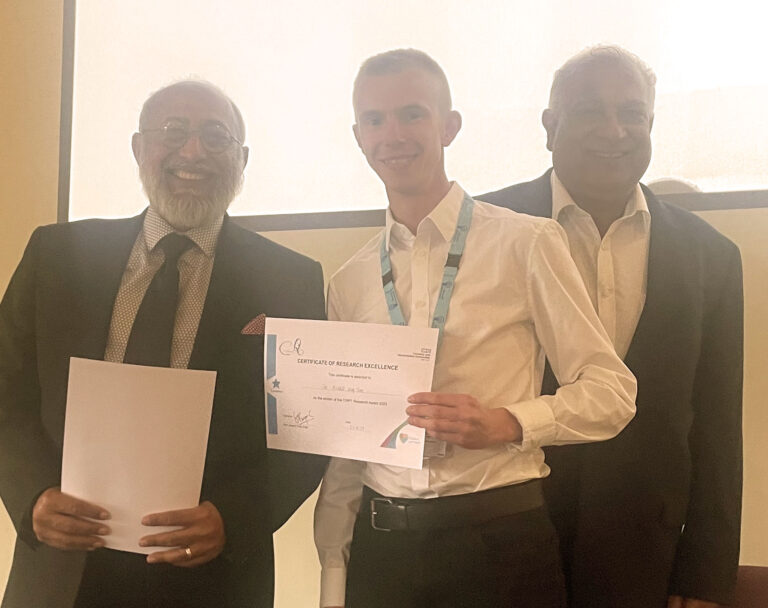
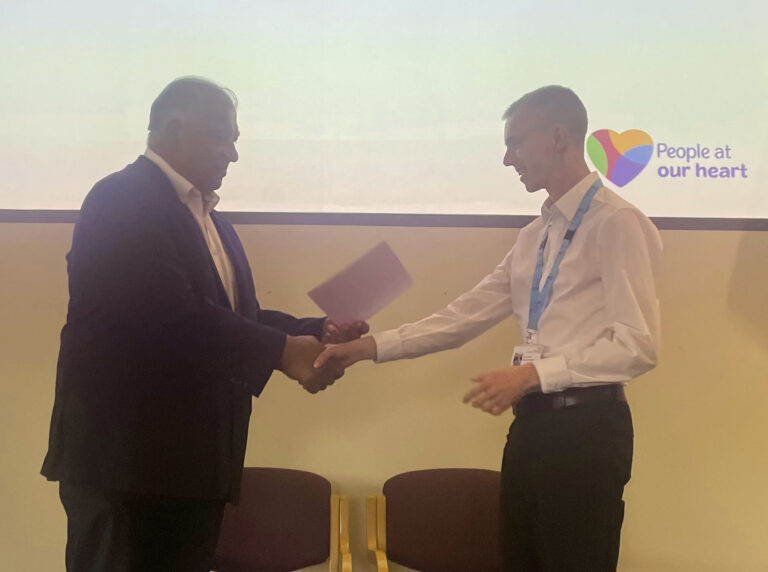
Zak and Zuhra were presented with the Coventry & Warwickshire NHS Trust (CWPT) Research award for 2023, with the Coventry Team’s PI Caroline Rowley, at the Research & Innovation department’s annual event on 27th June. The award celebrates the way in which research can be integrated into a clinical environment.
